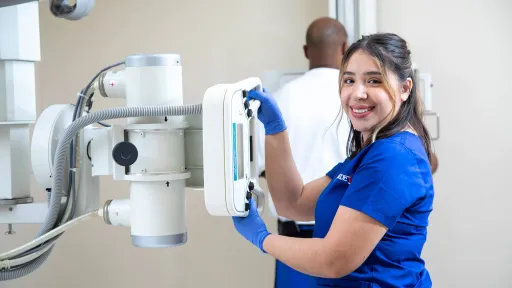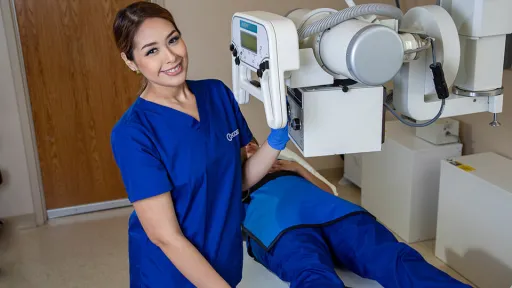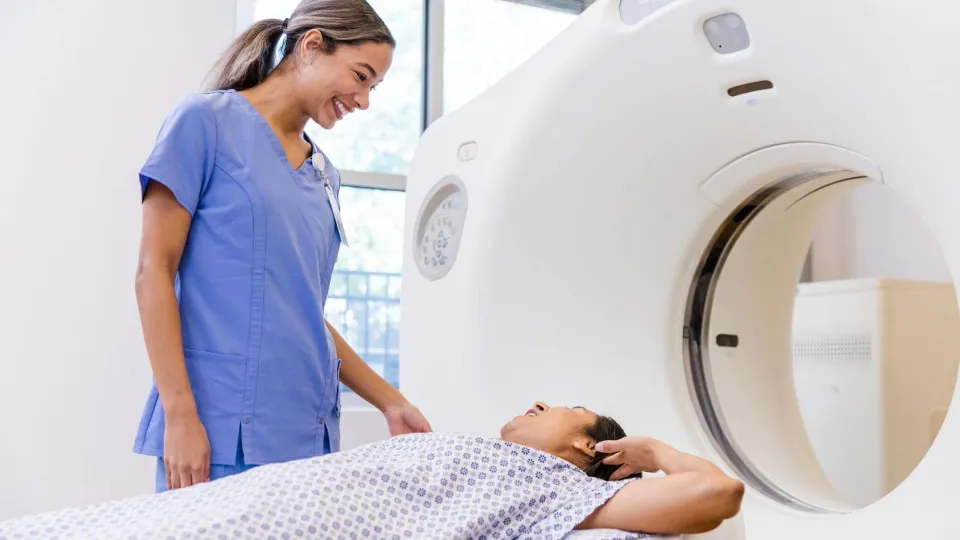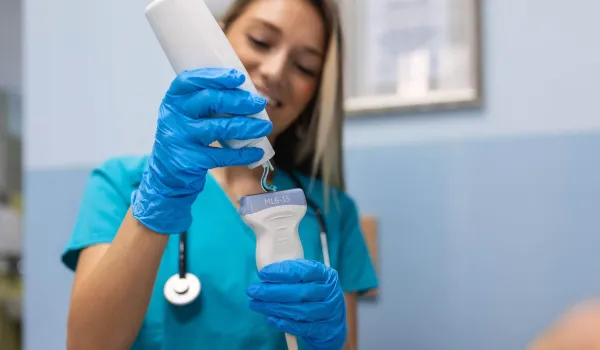
X-ray technicians, also known as radiologic technologists, play a crucial role in diagnostic imaging within the health care industry. These professionals use X-ray machines and other medical devices to generate images of the body's interior, which doctors then use to diagnose and treat medical conditions. The demand for radiologic technologists is growing; the Bureau of Labor Statistics projects a 6% job growth for this profession from 2023 to 2033. Based on these career prospects, it's unsurprising that many individuals are considering enrolling in radiologic technology programs. Let's explore the available educational paths.
Average Length of Radiologic Technology Programs

Radiologic Technology program lengths vary significantly based on the type of program chosen. These are the options:
- Certificate programs: Typically take around 12 to 18 months to complete
- Associate degree programs: Generally require about two years (24 months) of study
- Bachelor's degree programs: Usually take three to four years to finish
- Accelerated certificate programs: Allow students to complete their training more quickly
These options cater to different educational backgrounds and career aspirations, so it's essential for students to choose a program that works with their prior education and goals.
Related: Day in the Life of a Radiologic Technologist
Certificate Programs
Certificate programs in radiologic technology are designed for those with prior health care experience or a degree in another field. These programs typically last between 12 and 18 months and provide a curriculum more focused on essential skills and knowledge than associate or bachelor's degree programs. While certificate programs may have a more limited scope than associate degree programs, they are a quicker route to entering the workforce.
Associate Degree Programs
Associate degree programs in radiologic technology are the most common pathway for aspiring radiologic technologists. These programs usually take about two years (24 months) to complete and are a blend of classroom instruction and hands-on clinical experience.
Students enrolled in an associate's degree program learn essential topics such as anatomy, patient care, radiation safety, and medical imaging techniques. This comprehensive education prepares graduates for entry-level positions in various health care settings. Concorde Career College offers a Radiologic Technology associate degree program that combines theoretical knowledge with hands-on training and can be completed in as little as 20 months. This approach provides students the opportunity to practice skills necessary in the field.
Related: What Can You Do with an Associate Degree in Radiologic Technology
Bachelor's Degree Programs
Bachelor's degree programs in radiologic technology offer more in-depth study and potential for specialization. These programs typically take three to four years to complete and provide a broader education than associate degree programs. This may be advantageous for those seeking career advancement opportunities or specialized roles in radiology.
Pursuing a bachelor's degree in radiologic technology can help students better understand advanced imaging techniques, health care management, and research methods. Some schools also offer online bachelor's degree completion programs for certified radiologic technologists, allowing them to further their education while continuing to work.
While bachelor's degree programs require a more significant time investment, they may lead to better career prospects and higher earning potential. These programs often include opportunities for specialization in areas such as computed tomography, magnetic resonance imaging, and mammography, which can make graduates more competitive in the job market.
Factors Affecting Program Length

A radiologic technology program's length varies based on several factors. Knowing these factors may help prospective students choose the program that works best for them.
Full-Time vs. Part-Time Enrollment
Students who enroll in full-time programs may complete their education more quickly than those who opt for part-time enrollment. While it may extend the program's duration, attending part-time offers flexibility for those balancing work, family, or other commitments.
Prior Education and Transfer Credits
Individuals with prior education or relevant coursework may be able to transfer credits, reducing the time needed to complete a radiologic technology program. This can be particularly beneficial for those transitioning from related health care fields. However, the transferability of credits is at the discretion of the receiving institution. Concorde does not guarantee that prior credits earned will transfer.
Program Structure (Traditional vs. Accelerated)
Traditional programs follow a standard academic calendar, while accelerated programs offer a condensed curriculum. Accelerated programs are designed to be completed in a shorter time frame but require a more intensive study schedule.
Clinical Experience Requirements
Clinical experience is a crucial component of radiologic technology programs. The time required for clinical training varies, influencing the program's overall length. Some programs may offer more extensive hands-on training, which can affect the duration.
State-Specific Regulations
States have varying requirements for licensure and certification, which may affect the time needed to meet all necessary criteria. Prospective students should research their state's requirements to understand how they may affect their educational timeline.
Online vs. On-Campus Programs
Online programs may offer more flexibility in scheduling and pace but may still require in-person clinical training. The balance between online coursework and hands-on experience can influence the program's length.
Related: Three Common Myths About Radiologic Technology
Program Components
Radiologic technology programs typically combine classroom instruction, laboratory practice, and clinical experience. Here's a breakdown of the main components:
- Classroom instruction: Covers the theoretical foundations of radiologic technology
- Laboratory practice: Provides hands-on training with imaging equipment and techniques
- Clinical experience: Offers real-world practice in health care settings, supervised by experienced professionals
The radiologic technology program curriculum typically encompasses a broad range of subjects designed to equip students with the necessary knowledge and skills for a career in radiologic technology. Core courses often include:
- HIPAA rights: Understanding patient privacy regulations
- Radiation safety: Learning how to protect patients and staff from radiation exposure
- Human anatomy: Studying body systems relevant to imaging
- Math for radiology: Applying mathematical concepts in imaging procedures
- Radiation fundamentals: Grasping basic principles of radiation
- Medical imaging analysis: Interpreting imaging results
- Using imaging equipment: Gaining hands-on training with X-ray machines
- Patient care: Providing compassionate care during procedures
- Radiology modalities: Exploring different types of imaging techniques
- X-ray quality control: Ensuring optimal image quality
- Radiobiology: Understanding the biological effects of radiation
- Pathology in radiology: Learning about diseases visible through imaging
- Radiation protection: Implementing safety measures during procedures
- Pharmacology: Gaining familiarity with medications used in imaging
- Mobile X-rays for trauma: Learning techniques for portable imaging
- Imaging in surgery: Discovering the role of imaging during surgical procedures
- Advanced radiographic positioning: Studying techniques for positioning patients effectively
- Fluoroscopy: Understanding real-time imaging techniques
Related: Traits of a Good RAD Tech
Certification and Licensure

Preparing to become a certified and licensed radiologic technologist involves a step-by-step process:
- Complete high school education: A high school diploma or GED certificate is a foundational step that qualifies prospective students to enter accredited radiologic technology programs.
- Earn an associate degree: Enroll in and complete an associate degree program in radiologic technology from an accredited institution.
- Graduate from a program approved by the American Registry of Radiologic Technologists: This qualifies prospective students to sit for the ARRT certification exam.
- Pass the ARRT certification exam: Apply for and successfully complete the ARRT certification examination in radiography. This exam assesses radiologic technologists' understanding of radiologic principles and practices, ensuring that they meet national standards for practice.
- Obtain state licensure (if required): Most states require licensure, which may involve passing a state-specific exam or meeting additional criteria beyond ARRT certification.
- Adhere to ethical standards: The ARRT code of ethics is a crucial part of the application process, emphasizing the importance of professional conduct while practicing radiologic technology.
- Maintain continuing education: Complete 24 continuing education credits every two years to maintain ARRT certification. These credits may be earned through various formats, such as online courses, seminars, or self-study programs.
- Participate in continuing qualifications requirements: Radiologic technologists are encouraged to engage in a CQR process every ten years that evaluates their radiologic technology current skills and knowledge. This assessment ensures that they remain competent in evolving practices and technologies within the field.
- Stay informed about additional state requirements: Keep abreast of any changes in state regulations regarding licensure or continuing education requirements, as these may vary significantly across different states.
Related: Reasons To Become a Radiologic Technologist
Career Advancement and Specializations

Completing a radiologic technology program may open up numerous avenues for career advancement and specialization. These are some key opportunities to consider.
Potential Career Paths
Radiologic technologists have various career paths open to them after gaining experience and additional qualifications. Some of these positions are:
- Radiologist assistant
- Medical dosimetrist
- Radiation therapist
Specializations
Additional certifications in the following specializations may enhance a technologist's skills and employability:
- Mammography
- Computed Tomography
- Magnetic Resonance Imaging
- Fluoroscopy
- Bone densitometry
- Pediatric radiography
- Emergency radiography
Career Settings
Radiologic technologists may find employment in a variety of health care environments, including:
- Hospitals
- Physician's offices
- Diagnostic centers and laboratories
- Urgent care centers
- Radiology departments
- Mobile imaging services
- Educational institutions
Related: Where Can You Work as a Radiology Tech?
The average time required to become a radiologic technologist ranges from 12 months for certificate programs to four years for bachelor's degrees. With strong job prospects over the next decade, this field offers promising opportunities for those willing to invest time in their education.
It's essential to research local programs and understand the options available for those considering a career as a radiologic technologist. Pursuing an education in this field can lead to rewarding and impactful health care career opportunities.
What Do Radiologic Technologists Do? (2016, December 15). Concorde Career College. https://www.concorde.edu/blog/day-life-radiologic-technologist
U.S. BUREAU OF LABOR STATISTICS. (2024, April 12). Radiologic and MRI Technologists : Occupational Outlook Handbook: : U.S. Bureau of Labor Statistics. Bls.gov. https://www.bls.gov/ooh/healthcare/radiologic-technologists.htm
Radiologic Technology Associate Degree Program from Concorde Career Colleges. (2023). Concorde Career College. https://www.concorde.edu/diagnostic-programs/radiologic-technology/aurora
Ethics Requirements - ARRT. (n.d.). Www.arrt.org. https://www.arrt.org/pages/earn-arrt-credentials/initial-requirements/ethics/ethics-requirements
How to Advance in Radiologic Technology | Concorde Career Colleges. (n.d.). Www.concorde.edu. https://www.concorde.edu/blog/how-advance-radiologic-technology
Careers in Radiology. (2014, December 5). Concorde Career College. https://www.concorde.edu/blog/careers-radiology
Take The Next Step Towards a Brighter Future
Interested in learning more about our Radiologic Technology program?
We have a Concorde representative ready to talk about what matters most to you. Get answers about start dates, curriculum, financial aid, scholarships and more!







